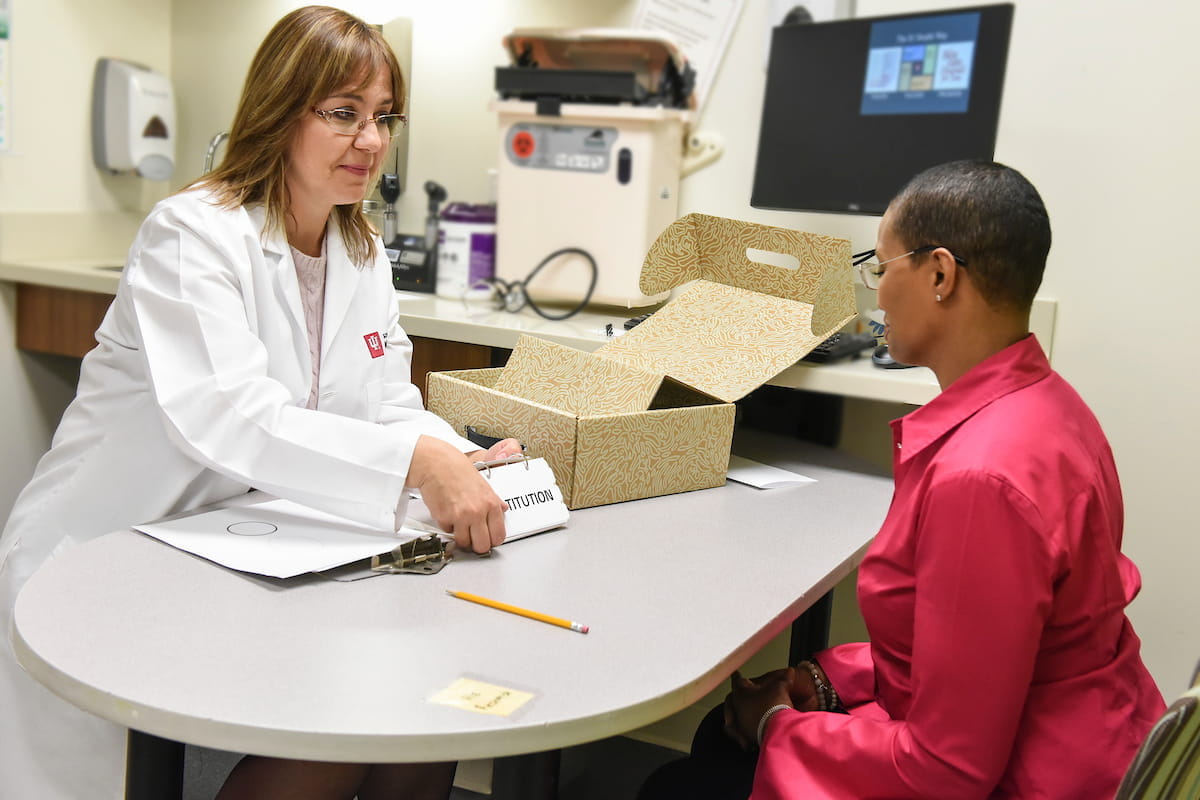Leading the Way

Laura Gates Dec 13, 2023
LIANA APOSTOLOVA, MD, has been on a 5-year quest to better understand a form of Alzheimer’s disease that strikes people early—before age 65. Her lab’s first-of-its-kind Longitudinal Early-onset Alzheimer’s Study (LEADS) now has 700 participants. The research is producing valuable insights—and even more questions.
“There is so much more we can learn,” said Apostolova, the associate dean of Alzheimer’s disease research and the Barbara and Peer Baekgaard Professor of Alzheimer’s Disease Research at Indiana University School of Medicine. “Unraveling the mysteries of early onset Alzheimer’s disease is very uplifting and motivating.”
More than 6 million Americans are living with Alzheimer’s. Just 6 percent of them are under the age of 65. In this younger subset, the disease progresses nearly five times faster than it does in people with late-onset disease.
Early-onset Alzheimer’s was a largely neglected population for research until Apostolova and her team launched LEADS. Now LEADS has IU’s largest grant, with nearly $80 million in total funding primarily from the National Institute on Aging. That grant is up for renewal next year.
“A large effort like this was much needed so we can make large-scale discoveries and have the power to unravel new genetic signals and new therapeutic avenues,” Apostolova said.
Since the early 2000s, Apostolova has delved into developing imaging techniques and genetic biomarkers for Alzheimer’s disease, becoming a leading national expert. She is a frequent speaker at national and international conferences and has co-authored hundreds of publications.
Alzheimer’s & Dementia, the journal of the Alzheimer’s Association, recently published a special issue devoted entirely to LEADS—a validation of their work’s impact.
“We’re really proving to the world how enormously prolific we are,” Apostolova said.
When LEADS launched in 2018, Apostolova’s team at IU consisted of 10 people. Since then, her team has tripled.
The number of U.S. data collection sites has increased from 14 to 18, and five international sites have been added—Buenos Aires, Barcelona, London, Amsterdam and Lund (Sweden). Apostolova’s co-principal investigators on the project include Gil Rabinovici, MD, University of California-–San Francisco; Brad Dickerson, MD, Massachusetts General Hospital and Harvard Medical School; and Maria Carrillo, PhD, of the Alzheimer’s Association.
“This is all launching from IU,” Apostolova said proudly. “It’s very exciting. We’re launching much more in-depth analysis of the genetic data with a larger scale of samples assembled around the world.” Apostolova has the daunting task of directing it all. She insists it isn’t “work”—it’s a fulfilling vocation that brings her joy.
“I’m in awe of how hard she works to keep the LEADS study running smoothly, and how she finds the time and energy to constantly try to build and expand on it, not just to advance research, but also to provide more services and benefits to study participants and their families,” said Kelly Nudelman, PhD, a geneticist working on LEADS and an assistant professor of medical and molecular genetics at IU School of Medicine.
The progress can’t be measured merely in numbers. Apostolova is reminded of that each week as she meets with real people living with this memory-robbing disease.
All of them enrolled in LEADS knowing their contributions likely wouldn’t be able to help them but could help provide solutions for future sufferers of early-onset Alzheimer’s.
For a few of them, however, there is some hope now.
In July, the FDA gave full approval to the first drug shown to slow cognitive decline in Alzheimer’s patients in the early stages of disease. Lecanemab (marketed as Leqembi), from drugmakers Eisai and Biogen, is an anti-amyloid drug that helps clear the plaques in the brain associated with Alzheimer’s. Apostolova presented positive findings from the Phase 3 clinical trial for a similarly working drug from Eli Lilly (donanemab) at the 2023 Alzheimer’s Association International Conference in Amsterdam in July.
“It’s a dream come true for us to be able to do something to help our patients,” Apostolova said.
It’s unknown whether this type of drug will benefit early-onset patients as much as the larger population of Alzheimer’s patients over age 65. That’s something LEADS will be evaluating in patients who qualify for a clinical trial.
Since the underlying pathology for each Alzheimer’s patient is unique, personalized medicine is key.
One surprising finding from LEADS has been the low rate of early-onset Alzheimer’s caused by an inherited genetic mutation, previously thought to be the main cause of Alzheimer’s disease in people younger than age 65. Among LEADS participants, just one percent have gene mutations causing the autosomal dominant form of the disease.
“We have learned early-onset Alzheimer’s disease is most often sporadic,” Apostolova said.
Because Alzheimer’s disease is more prevalent in Black and Hispanic populations, the LEADS team has actively focused on recruiting diverse participants with supplemental funding from the Alzheimer’s Association.
There is still much to learn and a long way to go before medical science can predict and prevent Alzheimer’s from developing in those at risk. What Apostolova knows is that the disease looks and behaves differently in people who develop symptoms before age 65.
“I believe our unique cohort will be of great interest to pharmaceutical companies,” she said. “These individuals hold unknown facts and potential hints for finding cures for Alzheimer’s.”
Liana Apostolova and her peers have made IU School of Medicine a leader in Alzheimer’s disease research. To learn how you can support their critical work, contact Andrea Spahn-McGraw at 317-278-2124 or anspahn@iu.edu.
Laura Gates
Laura is a senior writer with the Office of Strategic Communications. A native Hoosier, she has 25 years of experience in communications, having worked with newspapers and other media organizations in Indiana and Florida, along with small businesses, community groups and non-profit organizations. Before joining IU School of Medicine in January 2020, she was editor-in-chief of a lifestyle magazine serving the community of Estero, Florida.